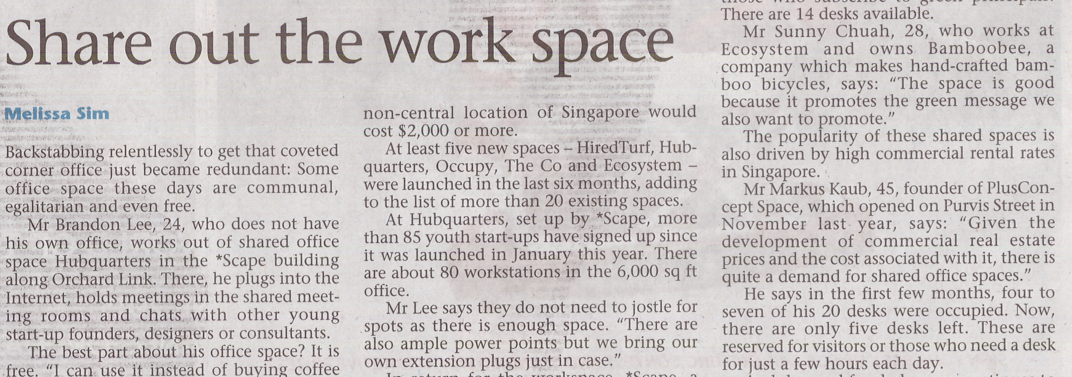What MNC Virgin thinks of co-working spaces
"Co-working spaces and small business incubators are cropping up more and more in major cities and allow start-up entrepreneurs... physical interactions necessary for effective collaboration whilst sharing the cost of renting the space." PlusConcept SPACE is just that and not only catering to start-ups, but also successful entrepreneurs, advanced businesses or overseas set-ups in Singapore who are looking for a productive, secure, 24/7 office location. The location of our co-working spaces and shared offices on Purvis street in Singapore further adds to this character.
Source: VIRGIN ENTREPRENEUR
e27 - surviving in the jungle of Singapore co-working spaces
PlusConcept Space 16 Purvis Street, 188595 Singapore
http://space.plusconceptinc.com/
@plusconcept
+65 9106 0455
http://e27.co/surviving-in-the-jungle-of-singapores-co-working-space/
LOVE THY NEIGHBOUR - Article
LOVE THY NEIGHBOUR
January 21, 2014 / Filed under: Business, / By: Michael Lenz
Co-working spaces are popping up throughout the region, offering diverse environments to help professionals make the most of their day
By Michael Lenz
Business travellers, freelancers and general workaholics know all too well the ordeal that goes along with having to work from a ‘café office’. Yapping baristas, whining kids and bad music often make coffee shops unpleasant places to get things done.
Steady pace: Plusconcept in Singapore was established three years ago. Few spaces like it have emerged recently
This is where co-working spaces step in. For a daily or monthly fee, a co-working space provides tenants with a desk, office infrastructure, round-the-clock operating hours and even coffee-making facilities. These spaces take elements from internet cafés, business centres, serviced offices and coffee shops and roll them all into an innovative business concept.
A group of IT professionals based in California conceived the co-working concept back in 2005 as a way for groups of likeminded people to come together to work.
In Cambodia, Colab is one of the first to enter the market. The “affordable, flexible and fun” space, in the increasingly urbanised Russian Market area of Phnom Penh, plays office to professionals from diverse fields and faraway lands. Canadian web designer and Colab co-founder Justin Pearce-Neudorf said Colab offers tenants “all the benefits of an office”.
Norwegian Ole Rosendahl joined Colab to avoid working from home. “I worked from home for three years. I missed a community,” he said. In joining Colab, not only did he find a community, but also two fellow professionals with whom he has teamed up to work on an internet service provider for a company in Norway.
An entire industry is emerging. There are now online co-working magazines such as deskmag.com; conferences, such as the Co-working Conference Asia; and books being published with titles including: Working in the UnOffice: A Guide to Co-working for Indie Workers, Small Businesses and Non-profits.
Amarith Charoenphan, founder of Hubba, a small co-working space in Bangkok’s fashionable Ekamai district, expects a multitude of new spaces to pop up throughout Thailand in the near future. A social enterprises consultant by trade, Charoenphan has already launched a Hubba joint venture in the northern city of Chiang Mai.
In Singapore, Markus Kaub founded Plusconcept, one of the first co-working spaces in the city, three years ago. However, the German business development consultant noted that an initial boom in co-working spaces in the city-state has cooled. “Right now, I’m not aware of any new co-working spaces having been set up in the past six months or so,” he said.
This may be due to a certain diversity in the co-working space business model. Backpacking university students, working on their theses between party nights, find a home at The HUB in Singapore. Meanwhile, a Singaporean oil company, a Vietnamese architect and a public relations firm from Switzerland enjoy the minimalistic design of Glowfish in Bangkok’s glitzy Asoke Towers. More relaxed is Charoenphan’s Hubba, where “freelancers, startups, designers and journalists can use the beautiful garden for a break or take a few stress-releasing jumps on the trampoline”, according to the founder.
Dime a dozen: Independent workers take up every table at a Phnom Penh coffee shop
Fiona Arjandran works from her desk at Paper & Toast, a co-working space in Kuala Lumpur’s business, shopping and nightlife district of Bukit Bintang. The Indian-Malaysian is employed by a fashion company, which pays for her desk.
“I am the only staff here in Kuala Lumpur,” she said, adding that being alone in an office is not her cup of tea. “Sharing an office with people from different industries is inspiring.”
According to Arjandran, her favourite co-worker is the cheerful Kim Choong, editor of Thirst Magazine, an online drinks journal that aims “to improve the drinking culture in Malaysia”. Choong’s role explains the variety of tipples found on her desk. “Sometimes we enjoy a drink together,” she said with a grin.
Back in Cambodia, Phnom Penh’s SmallWorld is an altogether different kind of co-working space. The graffiti-covered house certainly stands out among the huge, newly constructed villas that are common in Toul Kork district.
“We provide work spaces for young Cambodian startups,” said its founder, Rithy Thul. “But our most important goal is to bring them together with investors. We do not target the usual globetrotting digital nomads.”
Networking is a common feature of co-working spaces throughout the region. The majority organise networking events ranging from collaborations with international chambers of commerce to expert panel discussions.
“Sometimes we arrange a movie night or a barbecue party,” said Charoenphan with a smile: “You can make friends or even find the love of your life.”
German Co-working Article feat. SPACE
German Publication in Thailand about PlusConcept SPACE
Hubba, Paper & Toast oder Plusconcept statt Café-Büro
Co-working-Trend für Start-ups und Freiberufler erreicht Asien Kreative, IT-Fachleute, Freelancer, Start-up-Unternehmer, Designer und Architekten in Asiens Metropolen nutzen Co-working Spaces wie das Hubba in Asiens Metropolen.Michael ist Bangkok-Fan. Der Berliner genießt die Vielfalt des quirligen Lebens der thailändischen Hauptstadt. Deshalb hat sich der Softwarespezialist entschlossen, in Bangkok auch zu arbeiten. Programmieren kann man schließlich überall. Der Schreibtisch des 35-Jährigen steht im Hubba, einem Co-working Space in einem Stadthaus aus den 1960er Jahren mit schönem Garten in einer stillen Soi in Ekamai. Co-working Spaces sind nach ihrem Erfolg in Europa neuerdings auch in Asiens Metropolen der neue Trend. Vom Konzept her sind sie irgendwo zwischen Café und Internetcafé, Serviced Office und Business Centre von Hotels angesiedelt. Co-working Spaces bieten einen Schreibtisch, eine Büroinfrastruktur von Drucker bis WiFi und die Gesellschaft anderer Co-worker. Für diesen Service verlangen sie einen Mitgliedsbeitrag pro Tag oder auch pro Monat. Nie mehr lästiges Schlepping Zielgruppe sind Leute, die nicht zu Hause arbeiten wollen oder die es leid sind, mit ihren Laptops stundenlang in Cafés mit lauter Musik und kreischenden Kindern zu verbringen, oder Unternehmen, die erst einmal ihre Marktchancen austesten wollen, bevor sie ein teures Büro anmieten. „Zu uns kommen Kreative, IT-Fachleute, Freelancer, Start-up-Unternehmer, Designer und Architekten“, beschreibt Hubba-Gründer Amarith, im Hauptberuf Consultant für Start-ups im sozialen Bereich, die Zielgruppe seines Co-working Spaces. Zu den Vorzügen von Co-working Spaces gehört neben geringen Overheadkosten und sehr kurzfristigen Nutzungsverträgen das Ende des „Schleppings“. Für die Arbeit benötigte Dokumente oder Bücher kann man in seinem Mietschreibtisch lassen. Zudem sind Co-Working Spaces rund um die Uhr zugänglich, was besonders solche Nutzer mit Geschäftspartnern in anderen Zeitzonen anspricht. Die Nutzer dieser Büros auf Zeit zählen noch andere Vorteile auf. Harvardabsolvent Jochen Emig hat sich in Singapur niedergelassen, wo seine Freundin einen Job gefunden hat. Der Stuttgarter Softwareentwickler mit langjähriger beruflicher Japanerfahrung und Mitglied bei Plusconcept in Singapur, sagt: „Für die Arbeit brauche ich das Gefühl, in ein Büro zu gehen.“ Für den Franzosen Alexis Lefevre, der seinen Schreibtisch im Colab in Phnom Penh gemietet hat, ist der umgekehrte Weg wichtig: „Ich brauche das Gefühl, nach Feierabend heimzugehen.“ Co-working Spaces gibt es inzwischen in vielen Varianten. Während das Hubba den Charme einer munteren Bürowohngemeinschaft versprüht, The Hub in Singapur studentische Backpacker mit unfertigen Diplomarbeiten im Rucksack anspricht, setzt das Glowfish in der Beton- und Glasburg Asoke Towers in Sukhumvit 21 auf kühl-minimalistisches Apple-Store-Design, in dem sich eine Anwaltsfirma, eine Ölfirma aus Singapur, ein Architekt aus Vietnam oder auch eine PR-Firma aus der Schweiz wohlfühlen. In den Schreibtischen auf Zeit im schicken und gediegenen Glowfish fühlen sich Werbetreibende und Anwälte wohl.Im kleinen Paper & Toast in Kuala Lumpurs Büro-, Shopping- und Vergnügungsviertel Bukit Bintang arbeitet seit gut einem Jahr die indischstämmige Malaysierin Fiona Arjandran. Ihr Arbeitgeber ist ein Modeunternehmen. „Ich bin die einzige Mitarbeiterin hier in Kuala Lumpur“, sagt Arjandran. An dem Co-working-Konzept schätzt sie, dass sie nicht alleine ist. „Es ist inspirierend, sich das Büro mit Leuten zu teilen, die mit anderen Produkten und in anderen Branchen arbeiten“, sagt Arjandran und zeigt lachend auf ihre Tischnachbarin Kim Chong, eine Getränkejournalistin mit dem Onlinemagazin The Thirst, auf deren Schreibtisch eine Menge Flaschen mit alkoholischen Getränken stehen. „Manchmal trinken wir was zusammen.“ Plusconcept in einem alten Shophaus gleich hinter dem Raffles Hotel in Singapur setzt auf Unternehmen, die ihre asiatischen Marktchancen antesten wollen. „Für die ist angesichts der extrem hohen Mietpreise hier Co-working eine preiswerte und flexible Alternative. Zudem ist das chinesisch geprägte Singapur ein idealer „Sandkasten“ für solche, die Richtung China streben“, findet Markus Kaub, ein Heidelberger mit weitreichender beruflicher Ostasienerfahrung. Verliebt in Co-working SmallWorld in Phnom Penh hingegen hat den kambodschanischen Markt im Auge, den sich kleine einheimische Startupler erschließen wollen. Neben preiswertem Büroraum bringt SmallWorld die Jungunternehmer mit potentiellen Investoren zusammen. „Wir sind ein Inkubator“, beschreibt Rithy Thul, 26, die Essenz der von ihm gegründeten „Kleinen Welt“ und gleichzeitig das Community-Element, das allen Co-working-Spaces gemeinsam ist. Das reicht von Networkingevents mit internationalen Handelskammern bis zu Vorträgen zu allerlei Wirtschaftsthemen. „Wir organisieren auch schon mal Kinobesuche oder einen Grillabend“, sagt Hubba-Chef Amarith und fügt grinsend hinzu: „Man findet Freunde, und so mancher hat sich hier auch schon verliebt.“ Michael Lenz
update: PlusConcept | SPACE happy to be part of the Coworking Asia Conference (Tokyo 2013) + Presentation
We are happy to represent and share our insights about Singapore Co-working at the Coworking Asia Conference in Tokyo. Thanks for inviting our PLUSCONCEPT | SPACE.
OUR PRESENTATION VISUALS
Mediacorp checking out the SPACE for a TV Drama shoot
Thanks for considering our space for this. We usually don't have that much drama or 瑞恩 Rui En at our shared office.
ASCENT MAGAZINE | PlusConcept featuring great work space around the world... including ours :)
Screen Shot 2016-01-22 at 3.58.22 PM
Very nice an stylish article about co-working and pro shared offices around the world inclusive Singapore. Thanks to alongside other very fantastic great spaces in London, New York, LA, Hong Kong, Belgrade and Singapore.
Screen Shot 2016-01-22 at 3.58.37 PM
Screen Shot 2016-01-22 at 3.59.11 PM
Screen Shot 2016-01-22 at 3.59.21 PM
















